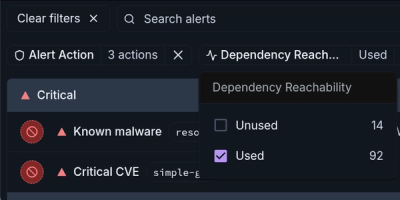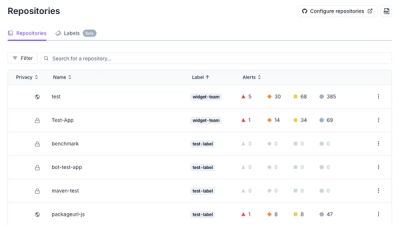
Product
Introducing Module Reachability: Focus on the Vulnerabilities That Matter
Module Reachability filters out unreachable CVEs so you can focus on vulnerabilities that actually matter to your application.
Imia (belarussian for "a name") is an authentication library for Starlette and FastAPI (python 3.8+).






The library is considered in "beta" state thus may contain bugs or security issues, but I actively use it in production.
Install imia using PIP or poetry:
pip install imia
# or
poetry add imia
If you are too lazy to read this doc, take a look into examples/ directory. There you will find several files demoing
various parts of this library.
Here are all moving parts:
imia.UserLike protocol.request.auth with UserToken.When a HTTP request reaches your application, an imia.AuthenticationMiddleware will start handling it. The middleware
iterates over configured authenticators and stops on the first one that returns non-None value. At this point the
request is considered authenticated. If no authenticators return user model then the middleware will create anonymous
user token. The user token available in request.auth property. Use user_token.is_authenticated token property to
make sure that user is authenticated.
imia.UserLike protocol.imia.UserProvider that corresponds to your user storage. Feel free to create your own.imia.AuthenticationMiddleware to your Starlette applicationAt this point you are done.
Here is a brief example that uses in-memory provider for demo purpose. For production environment you should use
database backed providers like SQLAlchemyORMUserProvider or SQLAlchemyCoreUserProvider. Also, for simplicity reason
we will not implement login/logout flow and will authenticate requests using API keys.
from dataclasses import dataclass, field
from starlette.applications import Starlette
from starlette.middleware import Middleware
from starlette.requests import Request
from starlette.responses import JSONResponse
from starlette.routing import Route
from imia import APIKeyAuthenticator, AuthenticationMiddleware, InMemoryProvider
@dataclass
class User:
"""This is our user model. It may be an ORM model, or any python class, the library does not care of it,
it only expects that the class has methods defined by the UserLike protocol."""
id: str
password: str = 'password'
scopes: list[str] = field(default_factory=list)
def get_display_name(self) -> str:
return self.id.split('@')[0].title()
def get_id(self) -> str:
return self.id
def get_hashed_password(self) -> str:
return self.password
def get_scopes(self) -> list:
return self.scopes
async def whoami_view(request: Request) -> JSONResponse:
return JSONResponse({
'id': request.auth.user_id,
'name': request.auth.display_name,
})
user_provider = InMemoryProvider({
'user1@example.com': User(id='user1@example.com'),
'user2@example.com': User(id='user2@example.com'),
})
authenticators = [
APIKeyAuthenticator(user_provider=user_provider),
]
routes = [
Route('/', whoami_view),
]
middleware = [
Middleware(AuthenticationMiddleware, authenticators=authenticators)
]
app = Starlette(routes=routes, middleware=middleware)
Now save the file to myapp.py and run it with uvicorn application server:
uvicorn myapp:app
Open http://127.0.0.1:8000/ and see that your request is not authenticated and user is anonymous. Let's pass API key
via query parameters to make the configured APIKeyAuthenticator to load user. This time
open http://127.0.0.1:8000/?apikey=user1@example.com in your browser. Now the request is fully authenticated as User1
user.
For more details refer to the doc sections below.
See examples/ directory.
FAQs
Full stack authentication library for ASGI.
We found that imia demonstrated a healthy version release cadence and project activity because the last version was released less than a year ago. It has 1 open source maintainer collaborating on the project.
Did you know?

Socket for GitHub automatically highlights issues in each pull request and monitors the health of all your open source dependencies. Discover the contents of your packages and block harmful activity before you install or update your dependencies.

Product
Module Reachability filters out unreachable CVEs so you can focus on vulnerabilities that actually matter to your application.

Company News
Socket is bringing best-in-class reachability analysis into the platform — cutting false positives, accelerating triage, and cementing our place as the leader in software supply chain security.

Product
Socket is introducing a new way to organize repositories and apply repository-specific security policies.